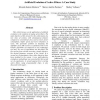Free Online Productivity Tools
i2Speak
i2Symbol
i2OCR
iTex2Img
iWeb2Print
iWeb2Shot
i2Type
iPdf2Split
iPdf2Merge
i2Bopomofo
i2Arabic
i2Style
i2Image
i2PDF
iLatex2Rtf
Sci2ools
114
click to vote
EH
1999
IEEE
1999
IEEE
Artificial Evolution of Active Filters: A Case Study
This article focuses on the application of artificial evolution to the synthesis of analog active filters. The main objective of this research is the achievement of a new class of systems, with advantageous features compared to conventional ones, such as lower power consumption, higher speed and more robustness to noise. The particular problem of designing the amplifier of an AM receiver is examined in this work. Genetic algorithms are employed as our evolutionary tool and two sets of experiments are described. The first set has been carried out using a single objective, the desired frequency response of the circuit. In a second set of experiments, three other objectives have been included in the system. A new multi-objective evaluation methodology was conceived for this second set of experiments. A second approach for evolving active filters, using programmable chips, is also discussed in this paper.
Related Content
| Added | 03 Aug 2010 |
| Updated | 03 Aug 2010 |
| Type | Conference |
| Year | 1999 |
| Where | EH |
| Authors | Ricardo Salem Zebulum, Marco Aurélio Cavalcanti Pacheco, Marley B. R. Vellasco |
Comments (0)

